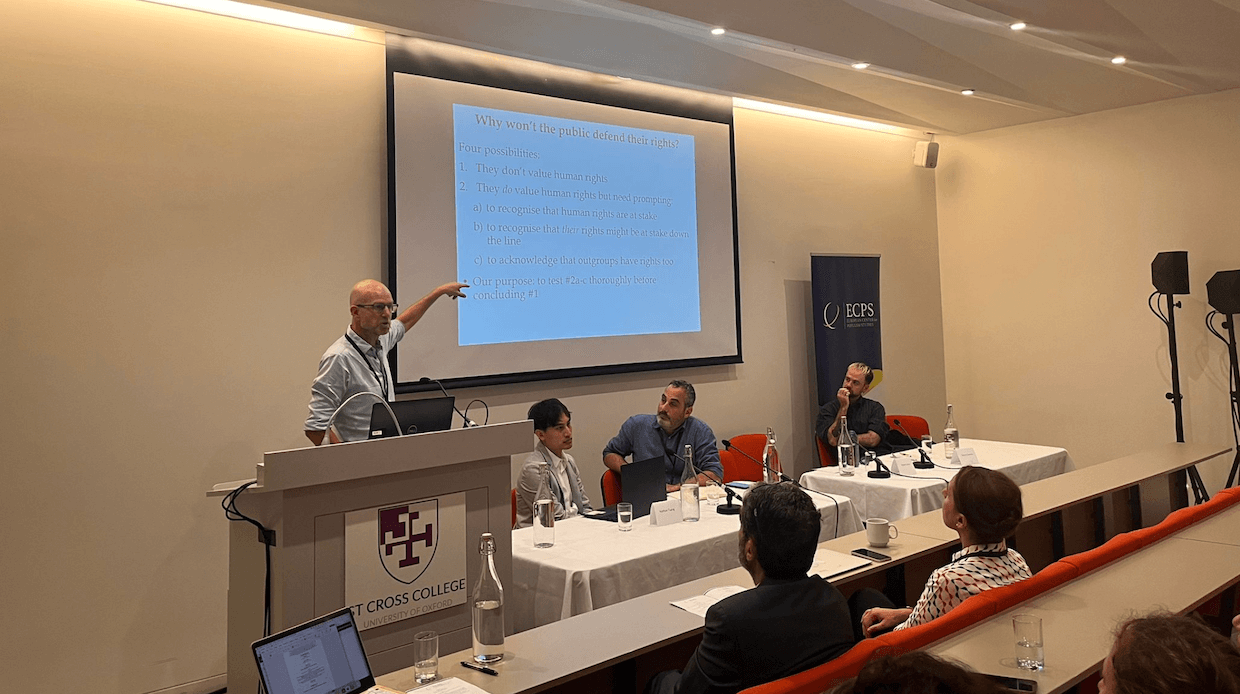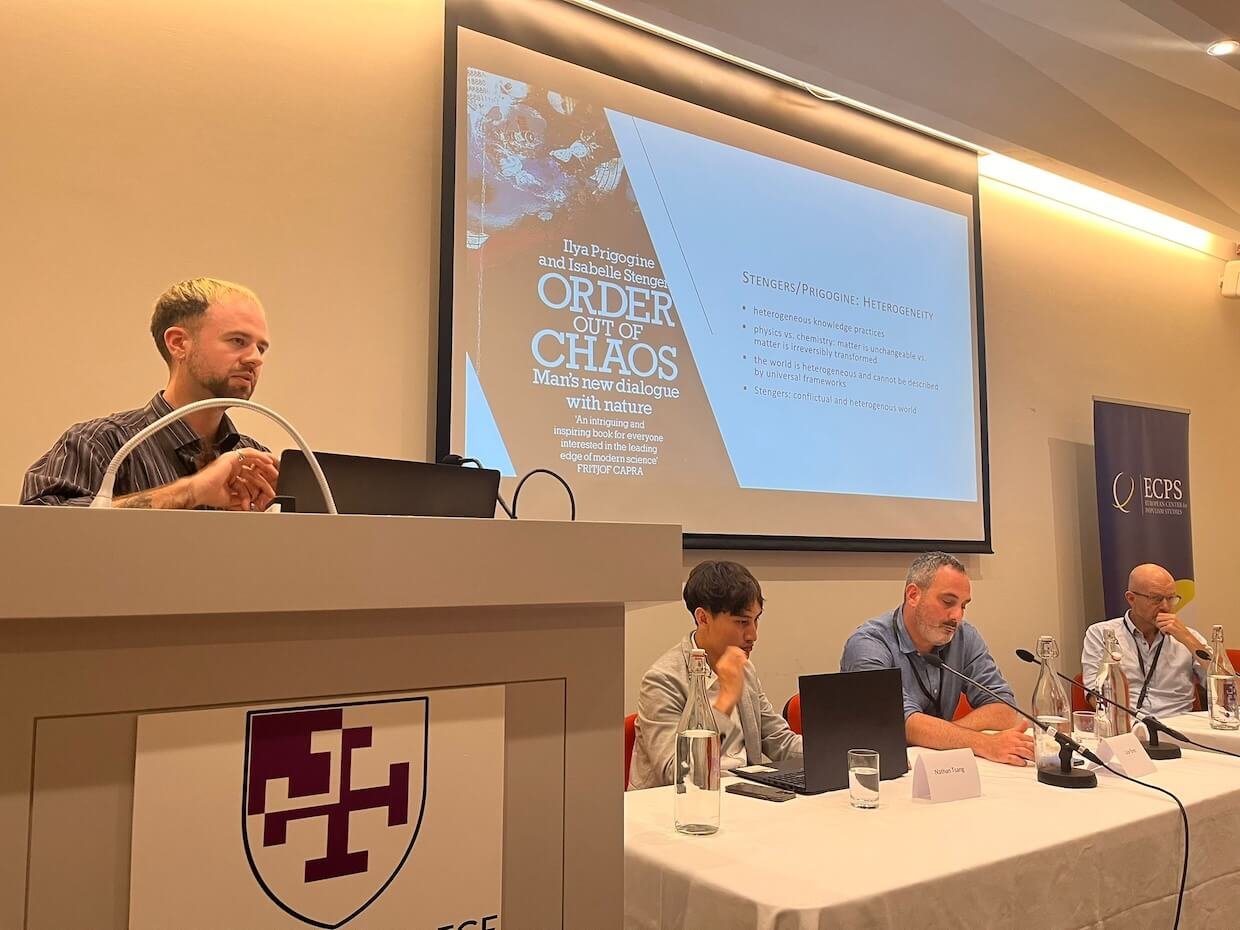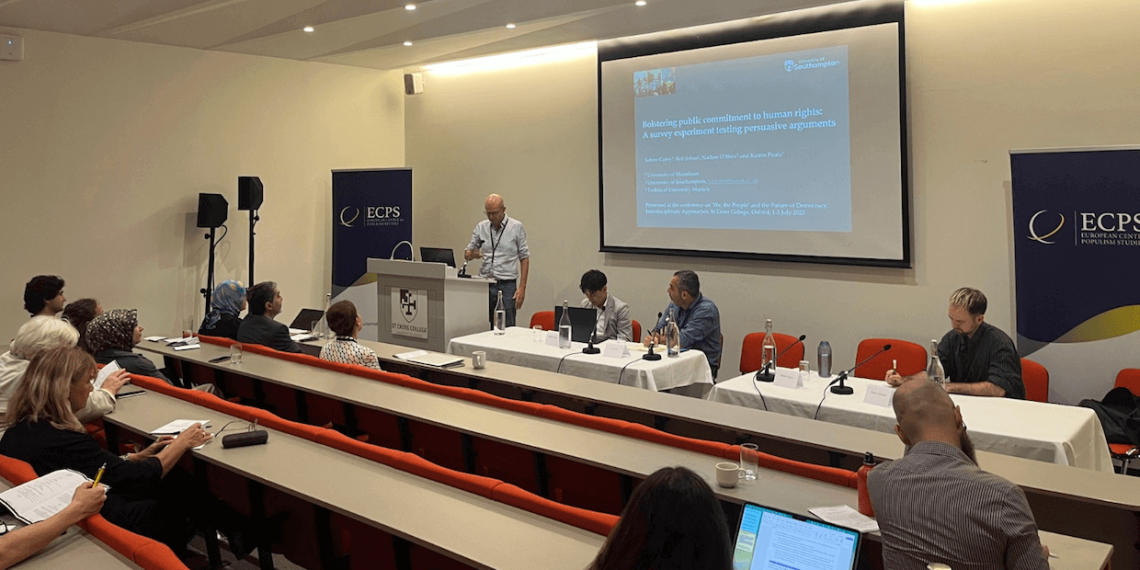Please cite as:
ECPS Staff. (2025). “ECPS Conference 2025 / Panel I — Politics of Social Contract.” European Center for Populism Studies (ECPS). July 8, 2025. https://doi.org/10.55271/rp00102
Panel I – Politics of the Social Contract at the ECPS Conference 2025 brought together diverse approaches to examine how democratic legitimacy, resistance, and pluralism are evolving in the face of global democratic backsliding. Chaired by Dr. Lior Erez (Oxford University), the panel featured Professor Robert Johns and collaborators presenting experimental research on public support for human rights under repression; Nathan Tsang (USC) explored how Hong Kong diaspora communities engage in covert resistance through cultural expression; and Simon Clemens (Humboldt University) introduced Isabelle Stengers’ cosmopolitical philosophy, proposing a radical politics of coexistence over consensus. Together, the presentations reflected on how the idea of “the people” is being contested, reimagined, and mobilized across social, empirical, and philosophical registers.
Reported by ECPS Staff
Panel 1 of the ECPS Conference “‘We, the People’ and the Future of Democracy,”—titled Politics of the Social Contract—offered a rich, interdisciplinary exploration of how democratic legitimacy, group identity, and political resistance are being reimagined in response to the erosion of liberal democratic norms. Held at St. Cross College, Oxford, and chaired by Dr. Lior Erez (Alfred Landecker Postdoctoral Fellow at the Blavatnik School of Government and Nuffield College, Oxford), the session brought together empirical, ethnographic, and philosophical perspectives on the contested meanings of citizenship and coexistence in our contemporary moment.
The social contract—once the symbolic foundation of liberal democracy—has come under intense pressure in recent years. The rise of exclusionary populist movements, the securitization of public discourse, and the erosion of trust in institutions have all complicated the relationship between citizens and the state. Yet, even as these developments undermine traditional models of political legitimacy, new forms of democratic practice and resistance are emerging. This panel offers an interdisciplinary examination of how these tensions play out in empirical and philosophical terms.
The panel began with a presentation by Professor Robert Johns (University of Southampton), who—alongside co-authors Sabine Carey, Katrin Paula, and Nadine O’Shea—shared findings from an innovative survey experiment conducted in Germany. Their study investigated public support for police violence across various protest scenarios and tested whether different rhetorical frames—rooted in human rights, democracy, or universalism—could reduce support for repression. Strikingly, they found that traditional rights-based arguments were only modestly effective, and that democratic appeals had greater persuasive power. The research revealed the fragility of rights discourse and the challenge of mobilizing public support across group divides.
The second paper, by Nathan Tsang (University of Southern California), shifts the focus to diasporic resistance under authoritarian threat. Drawing from rich ethnographic fieldwork with Hong Kong communities in the US, Tsang reveals how cultural activities can serve as subtle yet powerful platforms for political expression—especially under the shadow of transnational repression. His analysis shows how everyday practices blur the line between political and non-political, reshaping our understanding of what resistance can look like.
Finally, Simon Clemens (Humboldt University of Berlin) invites us into the philosophical realm of cosmopolitics, drawing on the work of Isabelle Stengers to rethink pluralism, coexistence, and the political beyond the demos. Clemens challenges both liberal and radical democratic assumptions, offering a vision of politics rooted in heterogeneity, co-presence, and what he calls “cosmic proceduralism.”
Together, these papers open vital questions about power, belonging, and democratic futures in an unsettled world.
Professor Robert Johns: “Exploring Human Rights Attitudes: Outgroup Perception and Long-term Consequences

In his empirically grounded and theoretically ambitious presentation, Robert Johns, Professor of Politics at the University of Southampton, examined the complexity of public attitudes toward human rights, with particular attention to how such attitudes are influenced by group identity, discursive framing, and rhetorical context. Delivered during Panel 1 of the ECPS Conference at Oxford University, his talk—titled “Exploring Human Rights Attitudes: Outgroup Perception and Long-term Consequences”—was a candid reflection on both the possibilities and limitations of persuasion in bolstering public support for human rights protections.
Professor Johns opened with an acknowledgment of the methodological diversity of the symposium and introduced his team’s (Sabine Carey, Katrin Paula and Nadine O’Shea) “quantitative persuasion experiment,” aimed not merely at observing public opinion but at exploring how to strengthen democratic and rights-based commitments in an age of populist backlash. He critiqued the prevailing notion that rights-supporting attitudes are stable, arguing instead that they are often thin, situationally dependent, and subject to manipulation by both rhetorical framing and group biases.
At the heart of Professor Johns’s research was a large-scale survey experiment conducted in Germany, designed to examine public reactions to the use of excessive police force against demonstrators. As Professor Johns explained during his presentation, respondents were randomly assigned to read a vignette describing peaceful protests, with the identity of the protestors varied across conditions—Muslim groups, climate activists, right-wing demonstrators, or an unspecified group. The primary dependent variable was the level of support for a hypothetical proposal to grant police amnesty for using excessive force in such scenarios.
Crucially, the study tested whether various types of arguments opposing this policy—framed in terms of human rights, democratic norms, universalism, or slippery-slope reasoning—could diminish public support for repression. As Professor Johns noted, a control group received no normative framing, providing a baseline against which the persuasive impact of each justificatory appeal could be assessed.
Professor Johns’ findings were striking. Across the sample, about one-third of respondents supported the repressive measure. Yet, surprisingly, most of the interventions—particularly those grounded in explicit human rights language—had only modest or negligible persuasive effects. The strongest rhetorical appeal was not a rights-based argument at all, but rather an appeal to “democratic rights,” suggesting that public support may be more easily activated by the language of democratic norms than by abstract invocations of “human rights.”
The study also explored how group attitudes shaped policy support. Respondents who harbored negative views toward the outgroup mentioned in the vignette—especially Muslims and climate activists—were significantly more likely to support repressive policies. However, even among this subgroup, some framing interventions, particularly those emphasizing universality or future consequences, slightly reduced support for police impunity. Intriguingly, the only subgroup where the interventions had a noticeable effect were those respondents who had previously signaled a willingness to deny rights across multiple domains—those least committed to human rights. This paradoxical finding suggested that even people initially inclined to restrict rights might be susceptible to targeted persuasion, while those who profess stronger commitments often remain unmoved.
Professor Johns also acknowledged the broader discursive challenge facing human rights advocacy. He pointed to the structural asymmetry between “urgent,” emotionally charged justifications for repression (e.g., national security, law and order) and the often abstract, long-term nature of rights-based arguments. In public debates, human rights defenders are frequently forced into reactive positions, which are temporally and rhetorically disadvantaged. As Professor Johns noted, in televised or political discourse, “rights” advocates often lose momentum by having to concede moral complexity or nuance in response to emotionally powerful narratives focused on threats, danger, or victimhood.
In concluding, Professor Johns emphasized that the lack of strong persuasive effects in the study was not necessarily a failure but an invitation to recalibrate both the content and the communication of human rights advocacy. He posed several provocations for future research and political practice: Should we reframe human rights in terms more resonant with popular democratic identity? Can rights-based arguments be made more immediate, urgent, or emotionally compelling? And how do we bridge the psychological gap between “us” and “them” when advocating for truly universal rights?
Ultimately, Professor Johns’ presentation underscored the fragility of rights-based norms in the public imagination and the difficulty of mobilizing support across group boundaries in polarized societies. Yet it also suggested that with careful framing, strategic messaging, and attention to underlying group perceptions, there remains space to expand public commitment to inclusive democratic principles. His empirical approach—rigorous yet normatively engaged—offered a valuable contribution to ongoing debates about how best to defend and revitalize the language of rights in a climate of democratic uncertainty.
Nathan Tsang: “Doing Politics Non-politically: Explaining How Cultural Projects Afford Political Resistance”

Nathan Tsang, a doctoral candidate in sociology at the University of Southern California, presented his ongoing ethnographic research titled “Doing Politics Non-politically: Explaining How Cultural Projects Afford Political Resistance.” The project explores how diasporic Hong Kongers in the United States engage in political resistance within seemingly non-political cultural contexts. Drawing on two years of fieldwork, Tsang’s analysis offers a nuanced sociological account of how diasporic communities under threat of transnational repression navigate and perform political expression in the everyday.
Tsang’s inquiry originates in an empirical puzzle he encountered while attending a Chinese New Year festival organized by Hong Kong immigrants in the US. Amid the food stalls and traditional decorations, he noticed politically charged banners and banned books—materials overtly critical of the Chinese regime. What struck him was the blending of cultural celebration with veiled political protest. Why, he asked, do diaspora Hong Kongers embed political messaging in cultural settings? And how is political resistance sustained under the constraints of surveillance and repression from abroad?
The backdrop to this phenomenon is the 2019 Hong Kong protest movement, followed by intense repression by the Chinese and Hong Kong governments. Many activists fled and now live in exile, facing both psychological trauma and the threat of transnational repression. As Tsang noted, diaspora Hong Kongers wish to remain politically engaged without exposing themselves or loved ones to state retaliation. This has led them to embed resistance within cultural forms—New Year fairs, movie clubs, and community centers—allowing them to “do politics non-politically.”
While this blending of culture and politics in exile has precedent—similar dynamics have been observed in the Turkish, Iranian, and Tibetan diasporas—Tsang argues that existing literature leaves gaps. Most notably, while repression is often theorized as a top-down force that curtails public expression, less is known about how individuals interpret and navigate repression in real-time, social contexts. Furthermore, scholars have yet to fully explore how individual acts of covert resistance become collectively legible and politically potent. Tsang’s intervention centers on this “how” question: How do individuals under threat of repression switch between cultural and political modes of engagement in everyday life? How does resistance become collectively cued and sustained?
To answer this, Tsang adopts an interactionist ethnographic methodology. He embedded himself in two diasporic Hong Kong cultural organizations located in a major US West Coast city: a movie club that promotes Hong Kong cinema and a community center offering social gatherings and workshops. Both organizations were founded by former activists from the 2019 movement and operate in the same local network. By selecting highly similar cases—geographically co-located, ideologically aligned, and socially overlapping—Tsang sought to isolate the micro-interactional dynamics that differentiate more successful political cueing from less effective ones.
These dynamics, Tsang argues, demonstrate that political speech in diasporic communities under repression is contingent not only on intention but on a shared ability to “read the room.” Through repeated participation in communal settings, individuals learn when it is safe—and expected—to shift from being cultural consumers to political actors. These micro-cues and switches, often mundane and unnoticed, are the mechanisms through which political communities are built and sustained under repression.
A third case, from the US Pacific Northwest, further supported this argument. There, a movie screening group resembled the earlier movie club, but with one key difference: a small stand offering books on Hong Kong politics. This unassuming addition, not even strategically planned, catalyzed in-depth public discussions about resistance and community formation. Tsang concluded that such material cues—books, spatial layouts, symbolic gestures—can serve as powerful anchors for interactional shifts toward political engagement.
Theoretically, Tsang’s research bridges social movement theory, diaspora studies, and the sociology of culture. While concepts such as abeyance (from movement scholarship) and hidden transcripts (James Scott) capture aspects of suppressed activism, Tsang insists on the importance of micro-sociological analysis: the cues, environments, and interactions through which resistance becomes collectively meaningful. His work contributes to the growing body of scholarship that treats culture not merely as a resource or backdrop, but as an active site of political negotiation.
Tsang concluded with a sobering reflection. While his findings highlight creative resistance, he also cautioned against romanticizing these efforts. In recent fieldwork, he has observed “Hong Kong Trumpists”entering the same cultural spaces to reshape diasporic narratives in line with right-wing populism. This underscores that the same interactional dynamics that enable resistance can also be harnessed to spread illiberal ideologies. Hence, understanding how political meaning is cued in everyday life is crucial not only for recognizing resistance but also for identifying the incubation of populist backlash.
Tsang’s presentation, rich in ethnographic detail and theoretical insight, offered a compelling portrait of how politics persists—and is transformed—in spaces where it is ostensibly absent. His work sheds light on the subtle yet powerful ways diasporic communities negotiate identity, solidarity, and resistance in an era of transnational repression.
Simon Clemens: “From Demos to Cosmos: Isabelle Stengers’ Cosmopolitical Philosophy and Democratic Pluralism”

Simon Clemens, a doctoral researcher at the Cluster of Excellence “Contestation of the Liberal Script” (SCRIPTS) and the Theory of Politics program at Humboldt University of Berlin, delivered a nuanced presentation exploring the political philosophy of Belgian philosopher Isabelle Stengers. Titled “From Demos to Cosmos: The Political Philosophy of Isabelle Stengers,” the presentation aimed to reinterpret democratic politics and pluralism through the lens of what Stengers calls “cosmopolitics.”
Clemens contextualized his talk within his broader dissertation research, which interrogates the political significance of the so-called “new materialisms”—a theoretical tradition that reconsiders the relationship between nature and culture, particularly in light of climate crisis and transformations in the sciences. Through this framework, Clemens argued that Stengers offers an alternative imagination for politics that departs from liberal and utilitarian frameworks, introducing a politics grounded not in consensus or inclusion, but in co-presence and heterogeneity.
Clemens began by contrasting Stengers’ approach to pluralism with that of John Rawls, the quintessential liberal theorist. Rawls, in his theory of “reasonable pluralism,” acknowledges the coexistence of diverse worldviews in a democratic society, held together by an “overlapping consensus” of reasonable doctrines. Clemens noted that for Rawls, this consensus emerges from the institutional conditions of liberal democracy, enabling a coherent political framework that respects difference within bounds of reasonableness.
Stengers, however, rejects this premise. Rather than viewing pluralism as stemming from reasonable disagreement about a shared world, she posits that the world itself is fundamentally heterogeneous. Drawing from her work with Nobel laureate Ilya Prigogine in the philosophy of science, Stengers argues that even the natural sciences—particularly physics and thermodynamics—offer conflicting and irreducibly divergent perspectives on the nature of reality. Thus, heterogeneity is not just a social fact or epistemological disagreement but an ontological condition.
To conceptualize how such radical heterogeneity can coexist politically, Stengers develops two central concepts: the “ecology of practices” and “cosmopolitics.” An “ecology of practices” refers to the co-existence of diverse knowledge systems, ways of life, and forms of evaluation that interact without collapsing into a singular hierarchy. Each practice is embedded in specific environments, produces its own modes of meaning, and carries internal logics that cannot be subordinated to universal standards. This ecology does not demand consensus but mutual awareness and the maintenance of relations that allow different practices to endure.
Cosmopolitics, meanwhile, names the political moment in which these ecologies interact. Importantly, Clemens emphasized that Stengers departs from Kantian cosmopolitanism, which seeks universal moral order. Instead, cosmopolitics resists universalization and instead foregrounds what she calls “co-presence”: the simultaneous, non-hierarchical existence of entities and practices that assert their heterogeneity. It is, in her view, a political response to the “generalized state of war” imposed by projects of global homogenization, including capitalist globalization and abstract universalism.
Clemens then turned to what he termed “cosmic proceduralism”—Stengers’ approach to political process that eschews quick resolutions and seeks to create space for heterogeneity to express itself. The core practice here is “slowing down”: a deliberate deceleration of decision-making and political composition to make room for those whose practices and values are often excluded or marginalized.
Slowing down, Clemens explained, is not inertia but attentiveness. It is the art of “paying attention to those inhabiting the land,” to borrow Stengers’ phrase. In practical terms, it introduces hesitation into otherwise mobilized, goal-oriented political processes. This aligns with Stengers’ critique of “mobilization” in both scientific and political contexts, where speed and efficiency often override careful consideration of affected actors.
Complementing this is her interest in the figure of the “diplomat,” who negotiates among divergent worlds not by imposing unity but by pacifying potentially hostile interactions. Through diplomacy and slowing down, a fragile mode of coexistence is made possible—a cosmos that is always emergent and never fully known.
In the final section, Clemens addressed the implications of Stengers’ cosmopolitics for democratic theory, particularly the concept of the demos. Drawing on thinkers like Jacques Rancière and Claude Lefort, he noted that radical democratic theory defines the demos as inherently open and contestable. “We, the people” is never a closed category; it is always subject to expansion and redefinition.
However, Clemens argued that Stengers moves away from the inclusion-oriented logic of radical democracy. Her concern is not with expanding the demos to include the excluded, but with preserving the heterogeneity of forms of life without subsuming them into a unified political subject. In this sense, her cosmopolitics does not seek to rule “in the name of the people,” but to enable the coexistence of radically diverse actors—what might be called the rule of the heterogeneous.
This leads to a provocative claim: the liberal and even radical democratic emphasis on inclusion can become coercive when it imposes a shared ontology or worldview. Inclusion, in this view, risks annihilating difference under the guise of universality. Thus, Stengers’ cosmopolitics can be read as a post-democratic or even anti-democratic gesture—not in the sense of rejecting democracy, but of shifting its foundation from shared rule to plural coexistence.
Clemens concluded by noting that Stengers’ political philosophy makes an important intervention in both democratic theory and broader discussions of pluralism. It challenges the consensus-seeking, universalist tendencies of liberalism and radical democracy alike. By proposing a cosmopolitical proceduralism rooted in heterogeneity, slowing down, and non-hierarchical co-presence, Stengers reimagines political life as the careful negotiation of difference rather than its resolution.
In an era of planetary crisis, epistemic conflict, and social fragmentation, Clemens suggested, such a rethinking may be not only timely but necessary. Cosmopolitics, in this light, becomes a radical democratic gesture that centers the right to exist differently—not just for people, but for practices, worlds, and beings too often ignored by traditional political thought.
Conclusion
Panel I of the ECPS Conference 2025 at Oxford University illuminated the evolving tensions within the modern social contract by offering deeply complementary empirical, ethnographic, and philosophical insights. Each presentation underscored the ways in which democratic legitimacy is not only being tested but reconfigured in response to exclusionary populism, transnational repression, and ontological pluralism. From Robert Johns’ sobering data on the limits of rights-based persuasion to Nathan Tsang’s compelling ethnography of diasporic resistance and Simon Clemens’ philosophical reimagining of democracy through Stengers’ cosmopolitics, the panel revealed the fragility and adaptability of democratic norms under contemporary pressure.
Chair Dr. Lior Erez skillfully moderated a session that moved fluidly between grounded data, lived experience, and theoretical provocation. What emerged was a picture of “the people” not as a unified voice, but as a contested terrain—shaped by identity, institutional trust, and the search for meaningful participation. The session called not for nostalgia over lost democratic certainties but for rigorous engagement with the evolving forms of political subjectivity, belonging, and resistance. As the crisis of the liberal script deepens, such interdisciplinary dialogues remain vital in charting pathways toward inclusive, resilient, and plural democratic futures.
Note: To experience the panel’s dynamic and thought-provoking Q&A session, we encourage you to watch the full video recording above.


